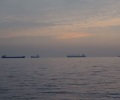Germany’s 2019 hard coal imports seen rising after mining ends

Germany is expected to import 45 million tonnes of hard coal this year, up roughly 1.4 percent from 2018 despite mounting competition from renewable energy, as the closure of domestic mines reduces domestic supply, importers said on Friday.
The total would comprise an estimated 30 million tonnes for power generation and 15 million tonnes of coking coal and coke, products used in steelmaking, data from lobby group VDKI showed.
Germany’s last two hard-coal mines, in the west of the country, closed at the end of December under a deal to stop unprofitable mining in favour of imports. The pair had contributed an annual 2.6 million tonnes of power station feedstock.
The coal importer lobby said hard coal usage would benefit from a court ban on logging in an ancient forest, a move that will impede the mining of domestic rival lignite, or brown coal, by utility RWE.
The court ruling curbs supply to RWE’s brown-coal power plants, and hard coal could cover part of the deficit.
The two types of coal accounted for a combined 38 percent of German power production last year.
Despite the forecast rise, there could be import losses in 2019 as a result of a long-term national plan, due within the next fortnight, on phasing out coal, VDKI said.
The projected increase would also be from a weaker base.
Volumes in 2018 declined by 13 percent year-on-year to 44.5 million tonnes as renewable energy gets priority on grids, elbowing out thermal plants’ output.
Steam coal imports for power stations alone fell 17 percent to 30 million tonnes.
Green power made up 40 percent of total generation in 2018, resulting from Germany’s politically driven process to replace fossil fuels.
VDKI estimated the addition of green power plants lost it 3 million tonnes of imports last year, while relatively high solar production in a hot year also played a part.
“2018, just like 2017, was a very bad year for hard coal in Germany,” VDKI chairman Wolfgang Cieslik said during the presentation of the data in Hamburg.
VDKI managing director Franz-Josef Wodopia said steelmaking usage of coal could benefit from higher demand projections by the World Steel Association for 2019, but cautioned that the macroeconomic environment had recently worsened.
“We cautiously expect the same level of imports as in 2018,” he said of coking coal.
Source: Reuters (Reporting by Vera Eckert; Editing by Dale Hudson)

 Hellenic Shipping News Worldwide Hellenic Shipping News Worldwide, Online Daily Newspaper on Hellenic and International Shipping
Hellenic Shipping News Worldwide Hellenic Shipping News Worldwide, Online Daily Newspaper on Hellenic and International Shipping























 PG-Software
PG-Software